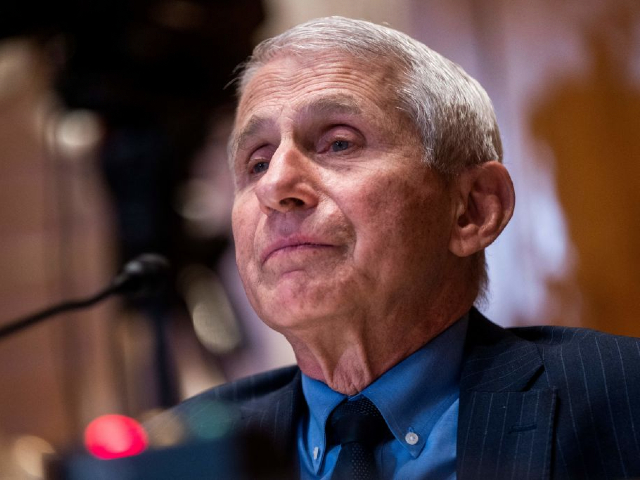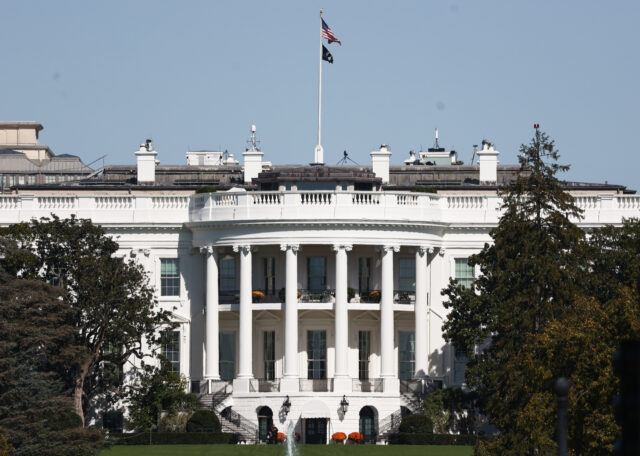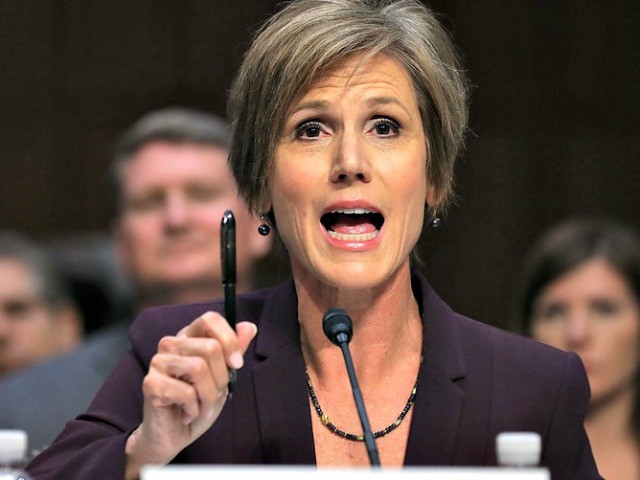The tide appears to be turning in the conservative movement, and the hunger to finally go on offense might well be answered with a Republican president in 2025.
Institutional barriers have been built by the administrative state for decades, safeguarding the permanency of bureaucratic power against the goals of any elected president — but conservative ones in particular.
While Republicans have historically been the party of small government, as Spencer Chretien, associate director of the Heritage Foundation’s 2025 Presidential Transition Project, told Breitbart News, “One thing conservatives need to wrap their head around is the fact that we need to use the levers of government and not just get the government out of the way.”
Chretien and the Heritage Foundation are working in a coalition of conservative groups to ensure unitive and effective governance if a Republican president takes over the White House in 2025.
“We are there in government, hopefully in 2025, to dismantle the administrative state,” he said. “But that also means we need to know how to use the levers of power and not just have an instinctual reaction to get the government out of everything.”
It will be a paradigm shift among Republicans — who have typically taken the Reaganite view that the use of government is antithetical to their principles — toward a populist movement that sees primarily that such a view has made Republican governance ineffective.
Dismantling “permanent D.C.” — the Praetorian guard of unelected and unaccountable administrative employees who remain in power regardless, and often in spite, of the elected president — is a top priority for conservatives who found themselves subject to a rude awakening when former President Donald Trump took office in 2017.

President Donald Trump signs an executive order in the Oval Office of the White House on Friday, January 20, 2017. (Kevin Dietsch/Pool via Bloomberg)
“Career federal employees are very good at understanding the minutiae of every single regulation there. They’ll take steps to trip you up, or spring a trap,” Chretien, who served in the White House as special assistant to Trump and associate director of the Presidential Personnel Office, told Breitbart News. “So we need to go in with people; new people who have been trained up, people who know what to expect, and people who are willing to use the levers of power to enact the president’s agenda.”
The executive branch is made up of about two million career employees and more than ten million federal contractors. “So that is the bureaucracy,” Chretien said. “Sitting atop those numbers, you have between 3,000 and 4,000 political appointees, if you succeed in filling all of them — if you succeed in getting people confirmed.”
“Let’s assume that every one of those 4,000 was fully aligned with the president’s agenda,” he continued. “You still have a tiny fraction of the government that’s actually in a position where they can be removed by the president.”
In other words, only a small minority of executive branch employees are truly accountable to the president, while the vast majority — the “expert” class — are heavily protected by civil service unions and otherwise.
“Americans are right to be skeptical of the bureaucracy,” Chretien said. “I think you need to get a sense of just how vast it is before you’re able to go about the work of dismantling the administrative state.”
As Breitbart News reported, the 2025 project is a blueprint not only for dismantling the administrative state, but also for finding, training, and staffing one primed to get conservative policies enacted at a national level.
Effective political leadership is a requirement for success, particularly in a bureaucratic environment hostile to conservative ideas.
The fundamental importance of political leadership and accountability in the executive branch has been lost for generations, and the American presidency has been weakened as a result.
“It’s an imperative part of our constitutional system to have a robust political management of the bureaucracy,” Chretien told Breitbart News.
“Politics is very important,” he continued. “The ultimate check on power in this country is the president’s accountability to the voters and other politicians’ accountability to the voters. The president is elected on a certain platform to do a certain job, and he’s entitled to a supportive staff that helps them achieve those goals.”
One of the primary arguments for the shift away from political leadership was staffing agencies with subject matter “experts” who would become mainstays, regardless of the president.
“I want to reject this idea that it’s always the case that career federal employees have more technical or scientific expertise than political appointees,” Chretien said. “That is not true. And political appointees, because they’re political appointees, are entitled to the appropriate deference from the careers.”
“We don’t necessarily need more ‘nonpartisan experts’ within an administration, what we need is political oversight of all aspects of the federal government,” he added.
Using the example of former National Institute of Allergy and Infectious Disease director Dr. Anthony Fauci’s outsized political power during the coronavirus pandemic, Chretien said, “The president has a public health policy, the president has an economic policy, the president has an education policy, and the voters put the president there to put in place those policies. Dr. Fauci doesn’t have, really, a say in the matter.”

Director of the National Institute of Allergy and Infectious Diseases Dr. Anthony Fauci testifies during a Senate Appropriations Subcommittee on Labor, Health and Human Services, Education, and Related Agencies hearing on May 17, 2022. (SHAWN THEW/POOL/AFP via Getty Images)
Fauci is not the only example of the importance of political leadership in the executive branch, and much of the motivation of the 2025 project came from lessons learned during the Trump administration.
Trump came into office with no previous experience in elected office, which “in many ways was a strength,” but many of the roadblocks put up by Barack Obama administration officials “underscore the importance of conservatives understanding how to navigate the bureaucracy.”
When Trump took office, Sally Yates, who had been Deputy Attorney General under Obama, became acting Attorney General.
“Within the first few days of the [Trump] administration, she instructed her department, the Department of Justice, not to defend an executive order that the president had signed,” Chretien said. “That was an early indication of just how steep the resistance was going to be among the career federal employees and the deep state.”
It was not just Democrat holdovers who were acting against the interests of the president. Some of Trump’s policy goals were not popular among many Republicans either.
“President Trump was was keenly interested in bringing back manufacturing jobs to this country through the imposition of tariffs, and he was open about that — he supported that throughout the campaign,” Chretien explained. “And yet, even the political appointees sometimes would undermine efforts to to enact those tariffs.”
Republicans typically see more resistance from federal employees than Democrats. “You can go look at a chart of how federal employees make political contributions.”
However, bureaucratic resistance to a president is not a phenomenon that started with Trump — though his administration did make conservatives and much of the public acutely aware of the issue.
When asked how the United States government had gotten to the point where the bureaucracy is powerful enough to undermine the authority of an elected president, Chretien said, “We’ve gotten here because the permanent political class, the permanent D.C. federal employees, are there at their agencies every day through Republican and Democratic presidents, alike.”
“They know how the game is played,” he continued. “It’s also the combination of the strength of the civil service unions and their allies in Congress and other federal regulations. And the media as well has played a part in this, because they have created this impression that federal employees are untouchable and can’t be removed from their positions.”
“It’s legendary just how secure their jobs are,” he said, adding that “conservatives have got to get comfortable with going into the government because right now, it is a profession that attracts a lot of left-leaning people.”
Aside from military service, government work has not typically attracted conservatives, and such an attitude has made it difficult for Republican administrations to govern effectively.
“Government service isn’t easy,” Chretien said. “Success in the private sector doesn’t necessarily transfer to success in the government; it’s kind of an art unto its own. And also, even within the government, just because you worked on [Capitol] Hill, doesn’t necessarily mean that you’re a good fit for the executive branch.”
One of the major goals of the 2025 project is to find Americans willing to serve in government and train them to be effective from the first day in office.
“What we need is political appointees who are willing to do the hard work, who aren’t just going to go along to get along with with their career counterparts,” Chretien said. “We are going to look outside D.C. We’re going to look at people who’ve made sacrifices, who’ve paid the price for standing firm.”
“We’re not going to have our knees buckle when the going gets tough,” he added.
Breccan F. Thies is a reporter for Breitbart News. You can follow him on Twitter @BreccanFThies.


COMMENTS
Please let us know if you're having issues with commenting.